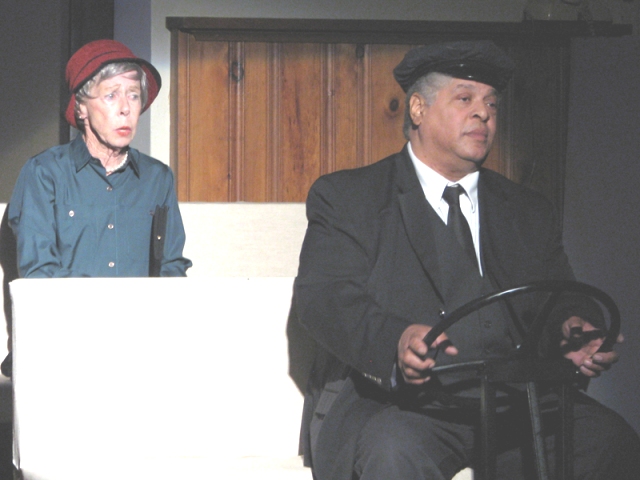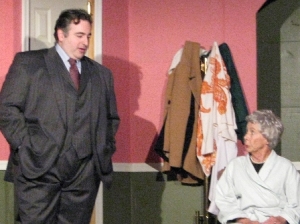DRIVING MISS DAISY is one of those shows that most of us know about even if we never saw the Pulitzer Prize-winning play by Alfred Uhry, or the movie version that followed the play’s success off-Broadway. It is the story about how true friendship can transform us, how it can change the way we treat others, and make stereotypes disappear.
Elderly Miss Daisy Werthan should not be driving her car, although she’s too obstinate to admit it, or, for that matter, admit she needs any help whatsoever. Her willfulness is not so surprising to any of us who have “raised” an elder parent—even if we don’t live in the South. Her son, frustrated with her dangerous driving behavior, finds a chauffeur to drive her where she needs to go. Thus begins the clashing of wills between a stubborn “old South” Jewish matriarch and a proud African-American. Gradually over a twenty-five year journey, from 1948 to 1973, the two develop a relationship that changes them both as well as the audience.
Veteran Suzanne Inman, her experience on New Jersey stages as well as in Philadelphia and New York City evident, as she plays a heartwarmingly scurrilous and scrappy “Miss Daisy Werthan”. It was as if the role was created for her. We, reviewers or critics, say that all the time, and when we say it, it is truly a compliment–meaning we can’t imagine anyone else in the role. There are many aspects of acting and in the detail is the ability to take over a role and make it your own.
Edward Ippolito, a regular on local stages, shows his grinning, easy-going self in his portrayal of “Boolie,” Miss Daisy’s son.
A newcomer to the Village Playbox stage is multi-talented Jay Burton, who plays “Hoke Colburn” with sheepish gentleness that so defines the character, without which, of course the show would not work.
DRIVING MISS DAISY premiered in New York on April 15, 1987, off-Broadway at the Studio Theater at Playwrights Horizons. The original cast included Atlanta native Dana Ivey as “Miss Daisy,” Morgan Freeman as “Hoke,” and Ray Gill as “Boolie.” The New York play closed after 1,125 performances, winning an Obie in 1987, the Pulitzer Prize in 1988, and several Outer Critics Circle awards. DRIVING MISS DAISY also ran for two seasons (1988-90) at the Alliance Theatre in Atlanta and won the Pulitzer Prize in 1988.
In 1989 it was adapted into a film, starring Jessica Tandy, Morgan Freeman, and Dan Aykroyd. The film received nine Academy Award nominations and won for Best Picture, Best Actress, Best Makeup, and Best Screenplay.
We often tend to judge a play before we see it, and indeed, its success or failure may depend on our knowledge of its history. We want to know the story when sometimes the point a playwright makes most often goes beyond the story, as its reputation hinges on earlier productions.
The off-Broadway production of DRIVING MISS DAISY received mixed reviews. Some reviewers saw its subtle and subversive portrayal of the civil rights movement and racial prejudice, while others criticized its romanticized and overly simplistic portrayal of a relationship between a rich white woman and her black employee. My view is that of the former. It is certainly both; however, there is a deeper side to this play, if we wish to look. If not, the play is equally entertaining as “a touching tribute to friendship and human dignity.”
Simplicity keeps us focused, but the play is far from simplistic. Here, despite the simple structure of the play and a few characters, there is a universal belief that we can “overcome” as Martin Luther King says in his “Dream” speech. At one point, Miss Daisy offers Hoke tickets to a dinner given in honor of Martin Luther King; he angrily refuses because of her patronizing attitude, because she didn’t just ask him “regular.” Later, we see that the relationship becomes one of understanding and is blind to racial barriers; she tells Hoke that he is her best friend.
This show will make you laugh and cry. It will warm your heart. I like that DRIVING MISS DAISY delves deeper into the relationship to look at the transition from the old South to the new, to raise questions of race relations, and the recalcitrant hierarchy of society—in this case, dramatized in the South.
The Village Playbox does not have the advantages of financial support, yet provides the gift of theatre art to the community. A few of the lighting and sounds cues seem off, and there is a longer wait than usual between scenes. Still, there is music related to the action. So, sit back and relax. The acting performances of Suzanne Inman, Edward Ippolito, and Jay Burton are memorable, and the production is certainly worth seeing.
DRIVING MISS DAISY
by Alfred Uhry
Music by Harvey Schmidt
Directed by Steve Allen
October 31 – November 15, 2014
The Village Playbox
First Presbyterian Church
28 Seventh Avenue
Haddon Heights, NJ 08035
609-230-8729
www.villageplaybox.org



